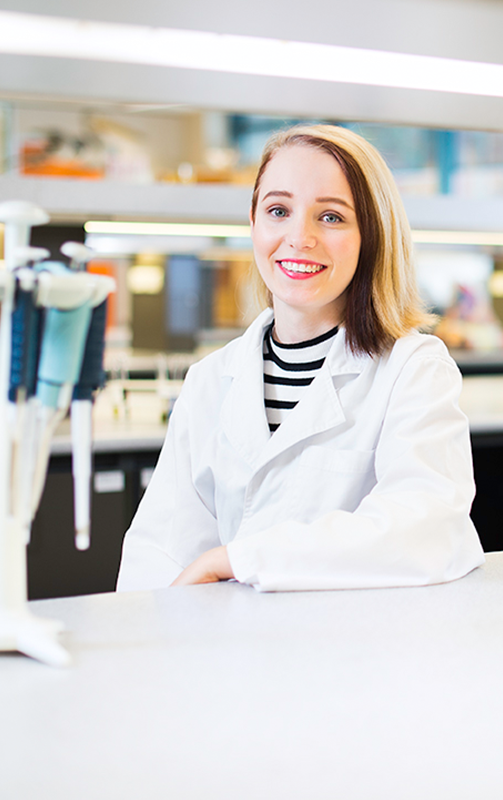The Centre for Cancer biology offers you the chance to further your education in an inspiring and internationally renowned research environment. We have a strong commitment to education, particularly postgraduate education, and offer research opportunities at every level, from undergraduate to PhD.
Student Research Opportunities
The Centre for Cancer Biology (CCB) is an Australian Medical Research Institute which carries out a world-class program of innovative research, making breakthrough discoveries in the fundamental biology of cancer, and translating these discoveries into new ways to prevent and treat this group of diseases.
The CCB is an alliance between SA Pathology and the University of South Australia and boasts the largest concentration of cancer research in South Australia.
CCB laboratories are led by distinguished full-time group leaders who carry out research across a broad spectrum of solid and blood cancers, focussing on the specialised areas of gene regulation, molecular signalling, tumour microenvironment, translational oncology and cancer genomics. In addition to these laboratories, our ACRF Genomics Facility provides access to state-of-the-art genomics research equipment, computing technology and bioinformatics expertise.
Translation of new discoveries into clinical practice is strengthened by the co-localisation of the laboratories within a single centre, as well as its proximity to the Royal Adelaide Hospital, the University of South Australia and the University of Adelaide, with which it shares key research facilities.
Studying at the CCB
The CCB is an internationally recognised Medical Research Institute, aiming to achieve tangible outcomes for patients with cancer, through its strong links with clinical practice.
A key platform within this goal is to foster high quality postgraduate studies to build the next generation of world-leading cancer researchers. We achieve this through a comprehensive program of mentoring and career development, led by our internationally recognised group leaders. Averaging in excess of $10m in competitive grant funding and publishingmore than 150 scientific articles in high impact publications each year, the CCB offers the ideal environment within which the next generation of research
leaders can thrive.
Scholarships
A range of domestic and international scholarships are available for students wishing to undertake Masters or PhD studies at the CCB.
Each CCB laboratory offers exciting opportunities for research studies at Honours, Masters and PhD level, as well as undergraduate summer student placements
Acute Leukaemia
Professor Richard D’Andrea
The group studies the genetic and epigenetic mechanisms involved in normal blood cell development and the changes associated with acute myeloid leukaemia and other haematological malignancies.New therapies for these diseases are investigated, and tested in clinical trial to ultimately improve patient treatment outcomes.
Cell Signalling
Professor Yeesim Khew-Goodall
The group’s focus is to understand what turns a benign cancer cell which remains local and treatable to a metastatic cell capable of spreading to multipleorgans.
Cytokine Receptor
Professor Angel Lopez
The group seeks to understand the mechanism of cytokine receptor activation in health and disease, to support the development of new drugs for unmet clinical needs.
Gene Regulation Section
Professor Greg Goodall
Research is focused on molecular mechanisms regulating cancer cell metastasis, including mechanisms involving microRNAs, circular RNAs and gene transcription. The Section includes research groups headed by Dr Cameron Bracken, focusing on microRNAs and their targets and Dr Philip Gregory, investigating the regulation of alternative splicing in cancer.
Leukaemia Unit, Molecular and Genetic Pathology
Professor Susan Branford
The Leukaemia Unit investigates the molecular response to therapy of patients with chronic myeloid leukaemia and the mechanisms of drug resistance.
Lung Research
Professor Paul Reynolds
The group has a range of projects involving lung cancer, pulmonary vascular disease and airway inflammation, and includes gene and cell therapy strategies and the use of conditionally replicative viruses as cancer therapies.
Lymphatic Development
Professor Natasha Harvey
The group’s focus is to understand how the lymphatic vasculature is “built” during development and how lymphatic vessel growth and development is dysregulated in pathological settings including cancer, lymphoedema and inflammation.
Molecular Pathology Research
Professor Hamish Scott
The laboratory’s research focus is the identification of disease causing genes and mutations in humans and the study of the molecular pathogenesis of diseases, including familial cancer syndromes and rare genetic diseases.
Molecular Regulation
Professor Sharad Kumar
The broad research focus of the laboratory is the cellular and molecular biology of disease.Westudy how cell death and ubiquitination control cell homeostasis during development and in disease.
Molecular Therapeutics
Professor Stuart Pitson
The laboratory examines sphingolipid-mediated cell signalling pathways and how they contribute to cancer and other diseases.
Neurovascular Research
Associate Professor Quenten Schwarz
The research focus of the laboratory is to advance understanding of the molecular development of the neuronal and vascular systems.
Tissue Architecture and Organ Function
Dr Guillermo Gomez
The focus is to understand how cell’s capacity to generate physical forces and sense the biomechanical properties of its environment contribute to the architecture and function of organs and how this is affected in different types of cancers
Translational Oncology
Professor Michael Brown
The laboratory team is focused on the preclinical and clinical development of novel antibody and T-cell-basedmethods for the diagnosis,monitoring and treatment of cancers, particularly of the skin, lung, and brain.
Tumour Microenvironment
A/Professor Michael Samuel
The laboratory’s major research focus is discovering the molecular toolkit that cancers use to exploit andmodify the capabilities of other cells and tissues around them (the microenvironment) to promote their own growth and spread. The laboratory’s specific aim is to uncover targets for new classes of therapies against cancers that are difficult to treat.
Vascular Biology and Cell Trafficking
Professor Claudine Bonder
The laboratory’smajor focus is to investigate the contribution of the blood vasculature to disease. Examination of how the blood vessels form and are activated during disease progression may provide new treatment options for cancers such as melanoma and breast cancer, organ transplantation to cure diabetes and provide valuable information to overcome allergies.
ACRF Cancer Genomics Facility
This state-of-the-art Facility is headed by Mr Joel Geoghegan and Dr Andreas Schreiber and provides opportunities to pursue studies in genomic medicine and bioinformatics




